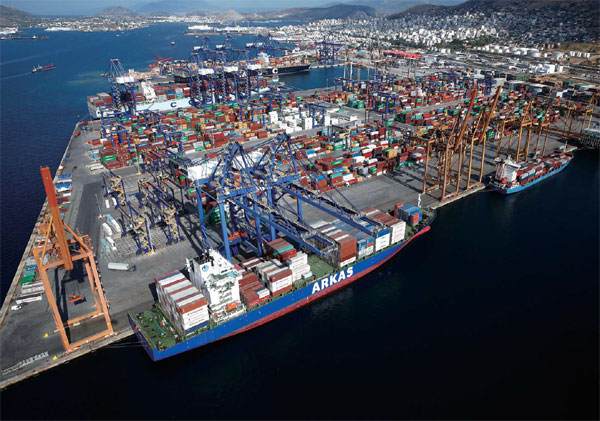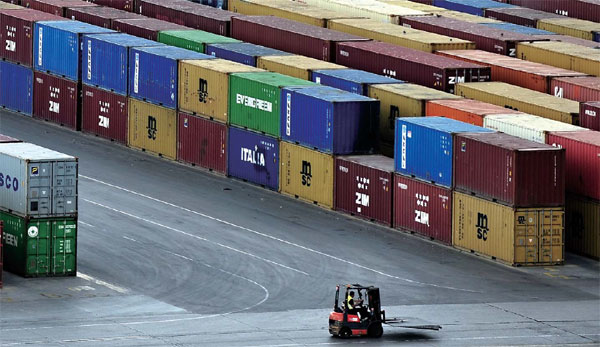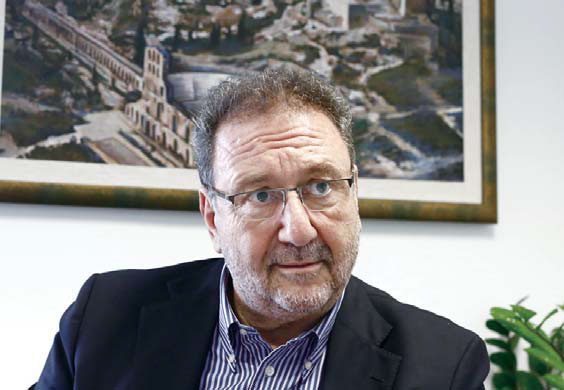China top suitor for Greek port share
Updated: 2015-12-11 08:19
By Maria Petrakis(China Daily USA)
|
||||||||
State-owned Cosco has opportunity this month to consolidate its spot at Piraeus Port as an anchor for Belt and Road aspirations in Europe
Red, blue, orange and green containers are stacked up on the road leading to Piraeus Pier II like giant Lego bricks, so high they cast a shadow over the cars and trucks rumbling into China Ocean Shipping Co's Greek container port.
From the sea, the cobalt-blue gantry cranes and mosaic of multicolored containers are a magnet for the monster cargo ships steaming into the harbor.
|
Container ships sit on the dockside in the Cosco Pacific terminal at Piraeus Port in Athens, Greece. Bloomberg via Getty Images |
|
A worker loads containers in the Piraeus Container Terminal, operated by Chinese state-owned shipping giant Cosco. AP |
Since the Chinese shipping behemoth agreed to take over container operations at two piers in Piraeus in 2008, traffic has surged at Greece's biggest harbor, making Piraeus one of the fastest-growing ports in the world.
For Cosco, the Chinese state-owned company listed in Hong Kong, Piraeus is the point at which China nudges into Europe as part of its plan to create a modern commercial empire pumping Chinese goods throughout the continent. It is, Premier Li Keqiang said in June last year, China's gateway to Europe.
Now, Cosco may be poised to consolidate its position in the Greek port. This month, Greece will seek binding bids for a 67 percent stake in the Piraeus Port Authority, the state-run company that operates the harbor. Cosco is among three bidders for the stake and considered a front-runner, given its investments so far and promise of more.
But as China pumps money into creating President Xi Jinping's vision of the Belt and Road Initiative, a modern-day Silk Road to Europe, it has bumped into a modern fiscal odyssey in Greece, the eurozone's most troubled nation, where foreign investment has slumped and stalled amid political turmoil and concerns of financial collapse.
The sale of the port has been delayed twice in just the past few months after being formally launched in March 2014, years after being included in the Greek state asset sales plan mandated by the European Union and International Monetary Fund in return for what became 240 billion euros ($260 billion) in rescue funds. The latest delay came at the request of the potential investors, Cosco included, with the Greeks setting Dec 21 as a new deadline for bids.
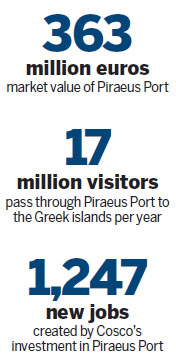
"They have been tested," admits Stergios Pitsiorlas, the sixth chairman of the 4-year-old Hellenic Republic Asset Development Fund, the agency charged with selling the Piraeus Port stake. "The issue has been pending for years now. But what's important is that now, for the first time, we are close to completion. We are very close."
For Greece, the stakes are higher now than they were six years ago, when the country's fiscal mess sparked a crisis that led to bailouts for countries including Ireland and Portugal, and called the existence of the common currency into question. Unemployment is still hovering at one-fourth of the workforce, the highest in the European Union; the economy has shrunk by about a third since the first bailout, and capital controls have been in place since late June on Greek banks to prevent their collapse, strangling businesses and individuals in need of liquidity.
Alexis Tsipras came to power in January as the firebrand young prime minister who opposed state asset sales and vowed to tear up the two bailout agreements that forced higher taxes and cuts in wages and pensions. He has tempered his tone since being forced in July to accept a new, 86 billion euro bailout to keep the country in the eurozone.
The Piraeus Port sale has taken on emblematic significance. Winning could unleash more Chinese investment, Pitsiorlas says, citing interest in a plan to build a major freight and logistics center on the Thriasio plain, an expanse that's been described as the industrial backyard of Athens. A major new airport planned for Crete, tendered in 2009 on the eve of general election, then canceled and now dusted off again, would give the Chinese an additional foothold in the Mediterranean.
Fosun, China's largest private conglomerate, is one of the investors in a group destined to develop the Hellinikon site, the Greek capital's former airport and Olympic Games venue, a project that could create 70,000 jobs and add 2 percent to Greece's economic output.
Chinese companies are pumping billions into Europe. Annual investment by Chinese companies in EU member states soared from virtually zero in the mid-2000s to 14 billion euros last year, according to a June report by Rhodium Group and the Mercator Institute for China Studies. "China's changing global outbound foreign direct investment footprint presents a once-in-a-lifetime opportunity for attracting capital to Europe and helping restart investment and economic growth," the report says.
That is something the Syriza government apparently has come to realize, commentators say.
China "appears to have no limit to available funds", says Andy Lane, a partner at Container Transport International Consultancy in Singapore. "The Greeks, on the other hand, need to sell the family silver to balance the books after decades of unsustainable existence - so it is in many respects an excellent marriage of convenience."
Piraeus' relatively short distance from the main Mediterranean maritime route allows it to act as both a trans-shipment hub and gateway, according to a 2012 report by McKinsey & Co, which said the country could transform itself into a regional cargo and logistics center as part of a 10-year plan. The existing infrastructure and deals with international operators such as Cosco provided a good starting point and critical mass for future expansion, McKinsey said.
Such a transformation of Piraeus and Thessaloniki, the second-largest harbor, which is also for sale, could add 9,000 new jobs over 10 years and about 1.3 billion euros in annual gross value added, McKinsey said.
On the road to the headquarters of Cosco's Greek unit, Piraeus Container Terminal SA, graffiti urges Cosco to leave and for Piraeus Port to remain in workers' hands. A banner exhorting locals to join a strike against the government's latest round of austerity measures - foreclosures and pension reforms - on Nov 12 is still strung along the side of traffic lights.
Inside Piraeus Container Terminal's headquarters, the tone is different. China's links with Greece are displayed side by side on the walls of the corridors, beginning with two large photos of an Olympic stadium in Athens from 2004 when the country hosted the Games next to Beijing's iconic Bird's Nest stadium from China's Olympic Games, four years later.
There are also signs of better days in Sino-Greek relations. In the lobby of the building, former prime minister Antonis Samaras, one of the champions of Cosco's investments in Greece, is photographed in a hard hat at the pier. In January, he called the Cosco investment the most important in Greece in the past decade, three days before he lost his job to Tsipras, whose election platform had included plans to put a brake on state asset sales, sparking concern among Chinese officials.
Cosco has seen five separate Greek premiers, not including caretakers, since it won the license to operate Pier II in 2008 for 30 years at a cost of 490 million euros. The deal has become a regular campaign issue as Greek politicians seek votes from union workers, such as those in the Piraeus docks, unhappy about austerity measures.
For Tassos Vamvakidis, a Greek who has been the commercial manager for the Cosco unit since it first got its Piraeus concession, actions speak louder than words. Cosco's investment in Piraeus, he says, has created 1,247 jobs.
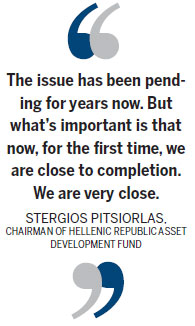
"Greece has to play a central role," he says. "Because there are others who would like to also play that role."
Pier II is now Cosco's biggest container terminal in Europe, slicing four to 10 days off routes to bigger ports like Rotterdam and Hamburg. It is the closest northern Mediterranean port to the Suez Canal. Electronics goods from companies like Hewlett Packard and Sony transit through Piraeus and then travel by rail to Central and Eastern Europe.
For China, says Lane of Container Transport International Consultancy, the Silk Road is less a single carriageway, with a start and an endpoint, than a web of solid infrastructure that facilitates multiple supply chains to and from China, part of an overall supply chain jigsaw puzzle. That now includes a Turkish port, Kumport Container Terminal, which Cosco bought jointly with China Merchant Holdings in October. Limassol, in Cyprus, is also being eyed by the Chinese.
Pitsiorlas dismisses concerns that those investments could pull transshipment volumes away from Piraeus. "Neither of these can replace Piraeus," he says. "Piraeus is of central significance to them."
Pitsiorlas says things are different now. For the first time, the Syriza government has signed up to a privatization program. There is "central support" from the government to proceed, he says.
With a market value of 363 million euros, Piraeus Port earned more from its concession fee from Cosco than its own freight business, according to last year's figures, raking in 36 million euros compared with 23 million euros in revenue from the Pier I operation it runs itself.
A stake in the port operator would also give Cosco exposure to some of the Greek company's profits from its lucrative passenger and car ferry business to the Greek islands. Piraeus is the biggest passenger port in Europe, with some 17 million Greeks and visitors on foot and by car passing through the harbor to the Greek islands.
From his office in Piraeus, with a view of one of the gantry cranes, Vamvakidis is unruffled by the delays and drama. "We're Cosconians," he says, playing on the name of his parent company. "Investments abroad by a country such as China reflect not only the financial aspect. The Chinese are a patient people."
For China Daily
|
Stergios Pitsiorlas, chairman of Hellenic Republic Asset Development Fund, says the Syriza government has introduced supportive policies to privatize the port. Provided to China Daily |
( China Daily USA 12/11/2015 page4)

 Nobel Prize 'to spur TCM development'
Nobel Prize 'to spur TCM development'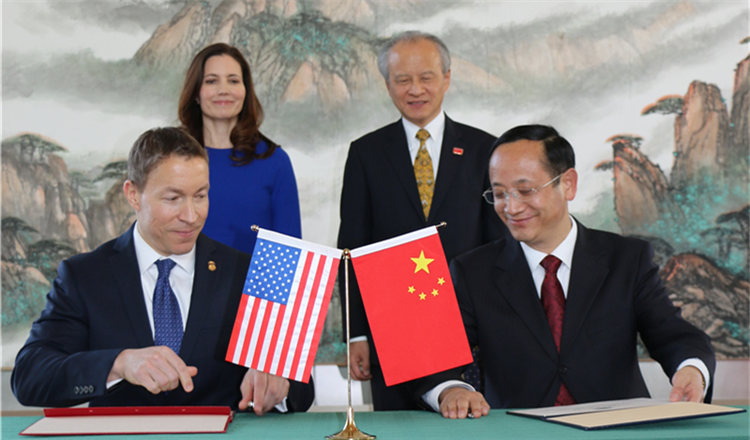
 US returns 22 recovered Chinese artifacts
US returns 22 recovered Chinese artifacts
 Internet makes life in Wuzhen more convenient
Internet makes life in Wuzhen more convenient
 AP photos of the year 2015
AP photos of the year 2015
 Miss World contestants visit welfare center in Hainan
Miss World contestants visit welfare center in Hainan
 Giant pandas brave the cold by settling in freezing north
Giant pandas brave the cold by settling in freezing north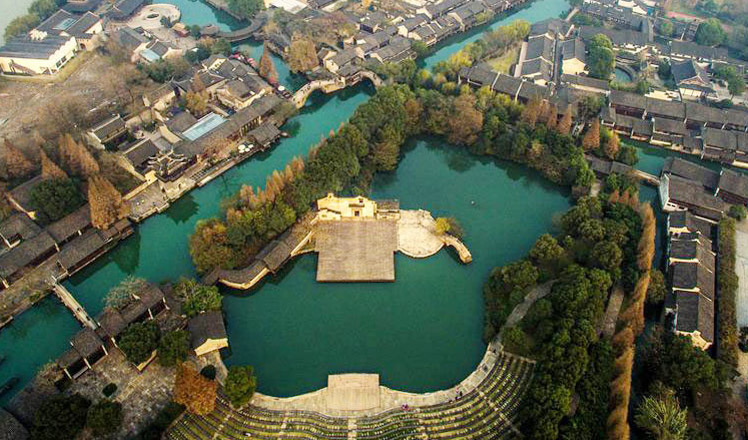
 World Internet Conference host Wuzhen: Charming water town
World Internet Conference host Wuzhen: Charming water town
 7 half-pound mutts become first test-tube puppies in world
7 half-pound mutts become first test-tube puppies in world
Most Viewed
Editor's Picks

|

|

|

|

|

|
Today's Top News
Shooting rampage at US social services agency leaves 14 dead
Chinese bargain hunters are changing the retail game
Chinese president arrives in Turkey for G20 summit
Islamic State claims responsibility for Paris attacks
Obama, Netanyahu at White House seek to mend US-Israel ties
China, not Canada, is top US trade partner
Tu first Chinese to win Nobel Prize in Medicine
Huntsman says Sino-US relationship needs common goals
US Weekly

|

|
